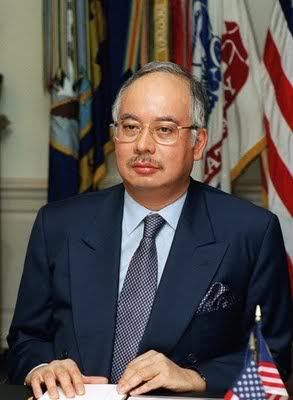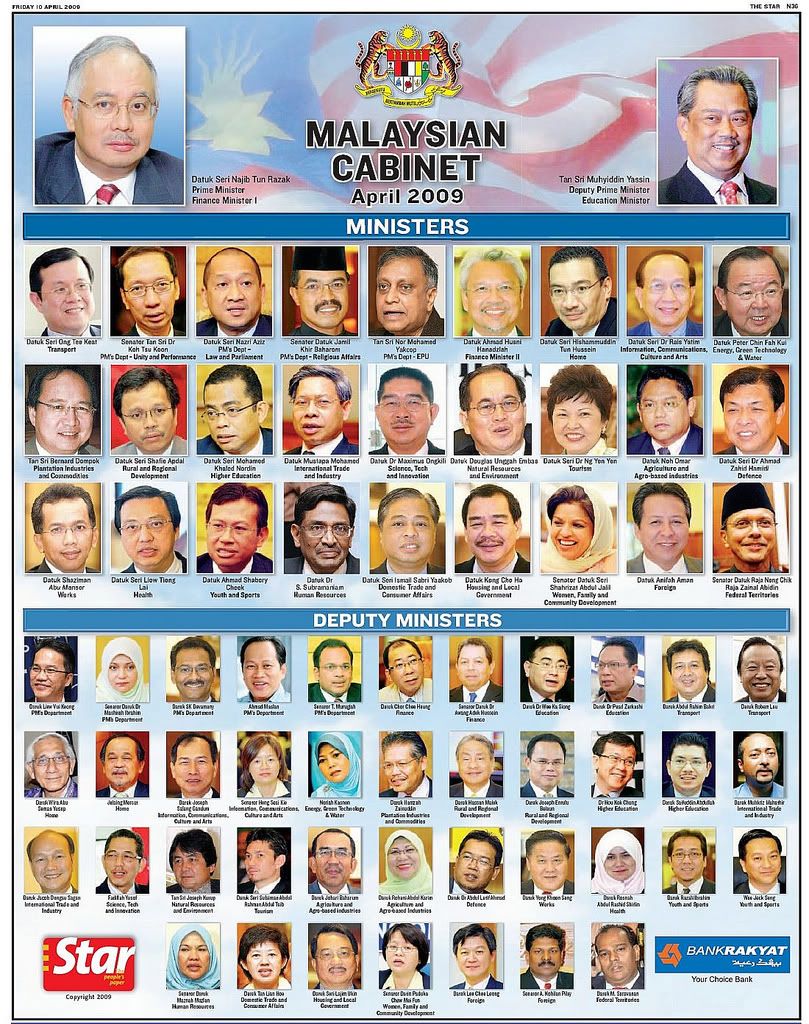
PM Najib of Malaysia.

Previously Najib Cabinet members.
Malaysian Prime Minister Najib Razak announced a cabinet reshuffle on Tuesday, dropping Malaysian Transport Minister Ong Tee Keat who lost in his bid for the Malaysia Chinese Association (MCA) presidency earlier this year.
While Ong was replaced by Malaysian Housing and Local Government Minister Kong Cho Ha, the latter's vacated position was filled by Chor Chee Heung, who was Malaysian Deputy Finance Minister.
The MCA, a political party run solely by Malaysians of Chinese descent, is one of the component parties of the country's ruling coalition.
According to Najib's statement issued on Tuesday, two members of parliament (MPs) and four senators were appointed deputy ministers.
The two MPs, namely Richard Riot Jaem and Chua Tee Yong, were appointed Deputy Foreign Affairs Minister and Deputy Agriculture and Agro-based Industry Minister respectively.
The four senators appointed as deputy ministers were G. Palanivel (Plantation Industries and Commodities), Lim Siang Chai (Finance), Maglin Dennis D'Cruz (Information, Communication and Culture) and Gan Ping Shou@Gan Ping Sieu (Youth and Sports).
Meanwhile, four deputy ministers switched portfolio.
Rohani Abdul Karim, who was replaced by Chua Tee Yong, was made the Deputy Domestic Trade, Cooperatives and Consumerism Minister, while Deputy Home Minister Jelaing Mersat took over as Deputy Transport Minister.
Deputy Foreign Affairs Minister Lee Chee Leong was appointed the Deputy Home Minister and Deputy Information Communication and Culture Minister Heng Seai Kie would become the Deputy Women, Family and Community Development Minister.
After much speculation, the long awaited Malaysian cabinet reshuffle finally took place on Tuesday, one day before Malaysian Prime Minister Najib Razak's visit to Laos.
The reshuffle has been expected after Ong Tee Keat, former Malaysian Chinese Association (MCA) president, failed in his bid to retain his presidency in the party election earlier this year.
Looking at the new cabinet line-up announced through a statement on Tuesday, one can apparently tell that the prime minister is committed to listening to various voices from different parties of Barisan Nasional (BN), the ruling coalition of the country's federal government.
Ong Tee Keat, the incumbent Transport Minister, was removed from the cabinet list.
Replacing Ong is Kong Cho Ha, MCA secretary-general.
Malaysia is a multi-racial country comprising of three main races, namely the Malay, Chinese and Indian.
MCA, run solely by Malaysians of Chinese descent, is the second largest component party in the BN.
It was also one of the parties that held intense independence talks with the British government in 1956.
Traditionally, the president, deputy president, elected vice president with the highest number of votes earned, and secretary- general of MCA will be appointed as ministers as the party top leaders are believed to be able to carry voices of Malaysian Chinese in the government.
However, it is noteworthy that current MCA president Chua Soi Lek was not made a minister during the reshuffle since he is neither a member of parliament nor a senator.
The four ministerial positions "reserved" for MCA went to the party's deputy president and two vice presidents, besides the secretary-general.
During the March 2008 general election, BN lost its two-thirds majority as many Malaysian Chinese and Malaysian Indians were said to have abandoned the coalition for failing to deliver what the people wanted.
In the recent two by-elections held this year, Malaysian Chinese voters once again did not show their support for the BN government.
Najib's appointment of a Malaysian Chinese as the deputy home affairs minister will definitely help the BN government to recapture the community's confidence towards the ruling coalition.
Malaysian Home Affairs Ministry is an important ministry who looks after internal security and the issuances of important documents, such as identity cards and passports.
When Najib first formed his cabinet last year, the original Chinese descent deputy minister in the ministry was removed, resulting worries among the Malaysian Chinese community as they believed that having a Chinese descent minister, or at least a deputy, would help them solve citizenship issues more effectively.
Due to historical reasons, many Chinese who have resided in the country for decades failed to obtained their citizenship, obstructing them from enjoying various medical or educational benefits provided by the Malaysian government.
With the new appointment, the concerns of the Chinese community are expected to be addressed well.
Meanwhile, two senators from the Malaysian Indian Congress (MIC) and People Progressive Party, who are also of the Indian descent, were appointed as deputy ministers.
The candidates representing the two parties in the last general election suffered from major defeat with MIC winning one parliamentary seat.
With leaders from the parties appointed as senators and deputy ministers, the Indian community in Malaysia would have more representatives in the government, making the parties relevant despite the political tsunami in 2008.
Najib has been striving to bring all Malaysians together and move towards transforming the country into a high income developed nation by 2020.
His 1Malaysia concept not only stresses on unity, but also motivates its government to be people oriented and deliver the best services to all Malaysians.
Clearly, Najib wants to bring all BN component parties to establish firm solidarity by having fair representation of each race and party in his government, which will definitely help the BN to regain its lost seats in the next general election.


